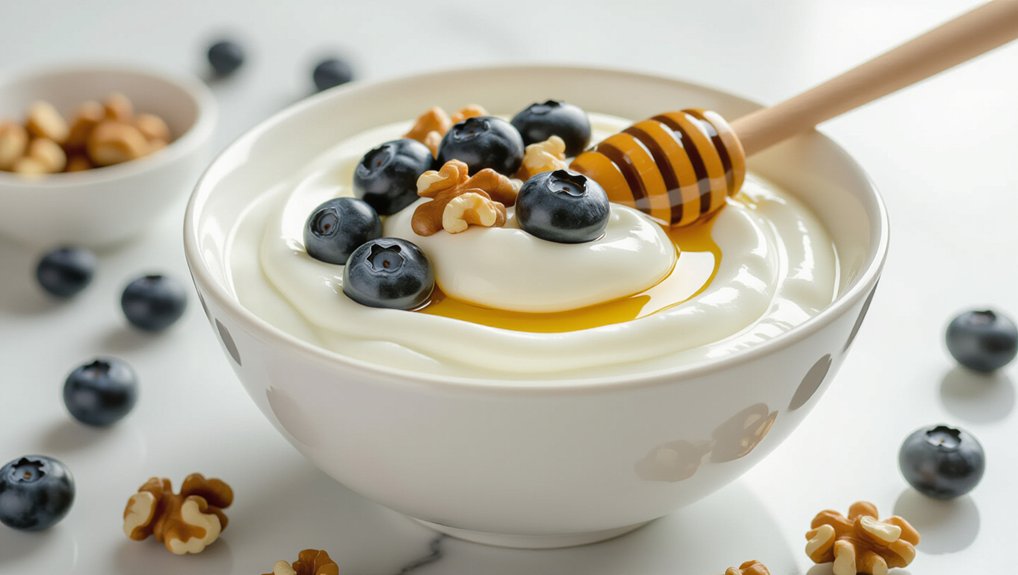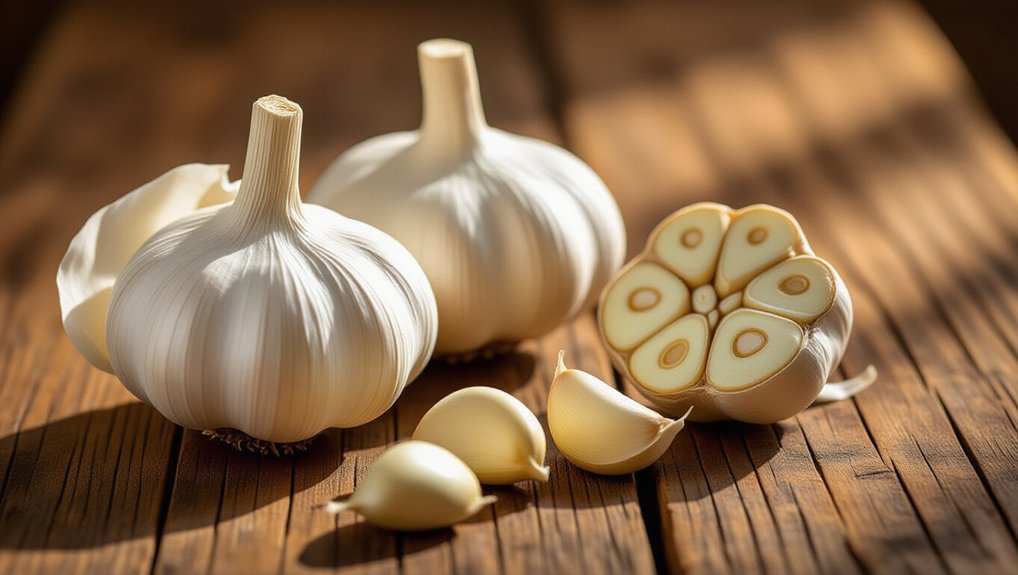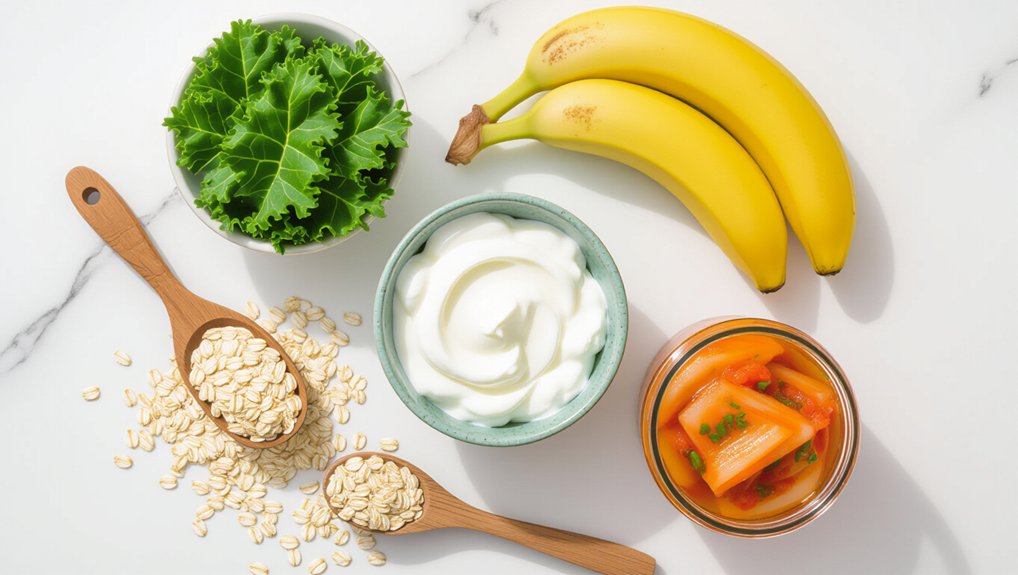You’ve probably heard about gut health everywhere lately, but you’re still not sure which foods actually make a difference. While the shelves overflow with expensive supplements and trendy probiotics, the most effective solutions might already be sitting in your kitchen. Five specific foods stand out from the rest when it comes to transforming your digestive system, and what you discover about their unique properties will change how you approach your next grocery trip.
Fermented Vegetables: Nature’s Probiotic Powerhouses

When you’re looking to boost your gut health naturally, fermented vegetables stand out as some of the most effective probiotic sources available.
These nutrient-dense foods contain billions of beneficial bacteria that’ll transform your digestive system from within.
Sauerkraut, kimchi, pickles, and fermented beets deliver diverse strains of lactobacilli and other healthy microbes.
You’ll find these probiotics help balance your gut microbiome, improve digestion, and strengthen immune function.
Unlike supplements, fermented vegetables provide probiotics alongside fiber, vitamins, and minerals that nourish both you and your gut bacteria.
Start with small portions since your digestive system needs time to adjust.
Add a tablespoon of sauerkraut to meals or enjoy kimchi as a flavorful side dish.
You’ll notice improved digestion and energy levels within weeks.
Greek Yogurt: Creamy Support for Your Microbiome

While fermented vegetables offer powerful probiotic benefits, Greek yogurt provides a creamy, protein-rich alternative that’s equally effective at supporting your gut health.
You’ll get billions of live cultures, including Lactobacillus bulgaricus and Streptococcus thermophilus, which help maintain your intestinal balance.
Greek yogurt’s thick texture comes from straining out excess whey, concentrating both protein and probiotics.
Choose varieties labeled “contains live and active cultures” to ensure you’re getting maximum benefits.
You can enhance your yogurt’s gut-supporting power by adding prebiotic-rich foods like berries, nuts, or a drizzle of honey.
Unlike regular yogurt, Greek varieties typically contain twice the protein, helping you feel satisfied while feeding beneficial bacteria in your digestive system.
Bone Broth: Healing Elixir for Intestinal Lining

Beyond providing probiotics like Greek yogurt, bone broth takes a different approach to gut health by directly nourishing your intestinal lining.
This nutrient-dense liquid contains collagen, gelatin, and amino acids like glycine and glutamine that help repair damaged intestinal walls and reduce inflammation.
When you simmer bones for 12-24 hours, you’re extracting minerals and proteins that strengthen your gut barrier. This barrier prevents toxins and undigested food particles from entering your bloodstream, reducing digestive issues and immune system stress.
You’ll get the most benefits by making homemade bone broth using grass-fed beef or free-range chicken bones.
Drink it warm as a healing beverage, use it as soup base, or cook grains in it to maximize your gut-healing potential.
Prebiotic-Rich Garlic: Feeding Your Beneficial Bacteria

Three powerful compounds in garlic—inulin, fructooligosaccharides, and allicin—work together to create an ideal environment for beneficial gut bacteria to thrive.
You’ll find that these prebiotics act as fuel for your good bacteria, helping them multiply and strengthen your intestinal barrier.
When you consume garlic regularly, you’re feeding Bifidobacterium and Lactobacillus strains that crowd out harmful pathogens.
Raw garlic provides maximum prebiotic benefits, though cooked garlic still offers significant value. You can crush fresh cloves and let them sit for ten minutes before cooking to preserve allicin’s potency.
Add minced garlic to salad dressings, soups, and roasted vegetables. Even one clove daily can positively impact your microbiome diversity and reduce inflammation throughout your digestive tract.
Fiber-Packed Jerusalem Artichokes: Digestive System Superfoods

Jerusalem artichokes pack an impressive 2.4 grams of inulin per ounce, making them one of nature’s richest sources of this powerful prebiotic fiber. When you eat these knobby tubers, you’re delivering concentrated fuel directly to your beneficial gut bacteria. The inulin ferments in your colon, producing short-chain fatty acids that strengthen your intestinal barrier and reduce inflammation.
You’ll find Jerusalem artichokes have a crisp texture and nutty, slightly sweet flavor. Try them roasted, sautéed, or raw in salads.
Start with small portions since the high fiber content can cause digestive discomfort if you’re not accustomed to it. Regular consumption supports healthy bowel movements, improves mineral absorption, and promotes the growth of bifidobacteria and lactobacilli in your microbiome.
Conclusion
You’ve discovered five exceptional foods that’ll revolutionize your gut health journey. By incorporating fermented vegetables, Greek yogurt, bone broth, garlic, and Jerusalem artichokes into your daily routine, you’re providing your digestive system with essential probiotics, prebiotics, and healing compounds. Don’t wait to start making these changes – your gut microbiome will thank you, and you’ll notice improved digestion, enhanced immunity, and greater overall vitality within weeks.


